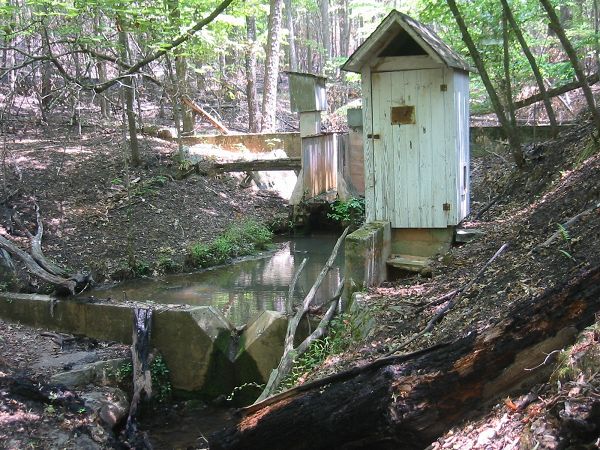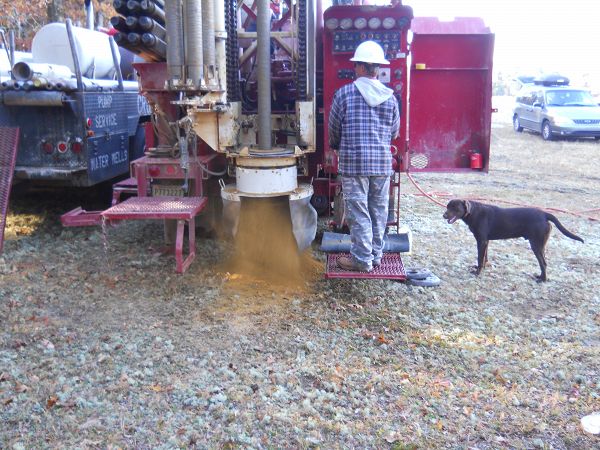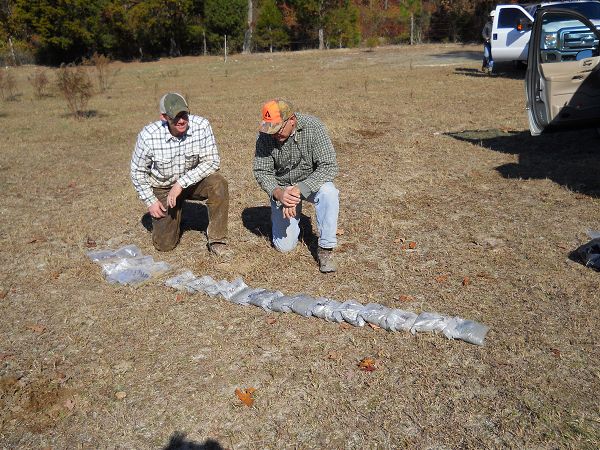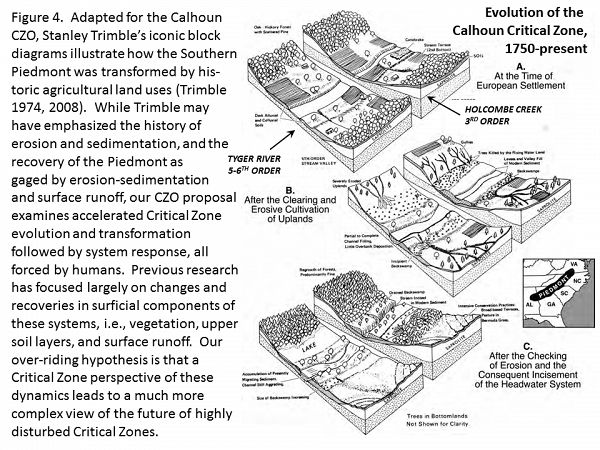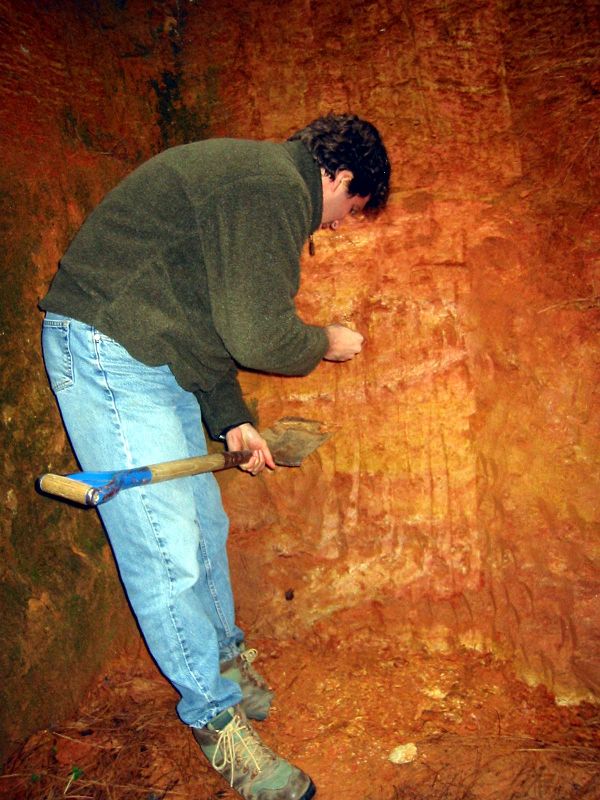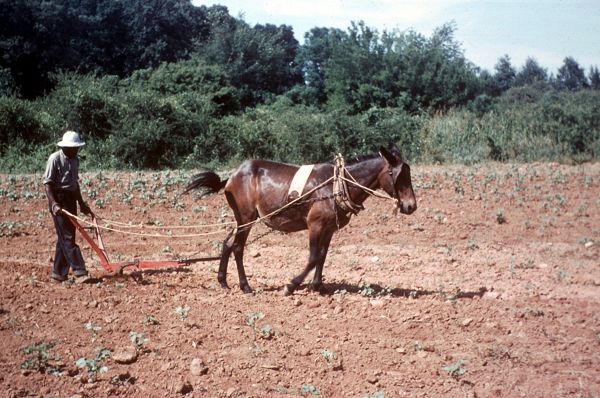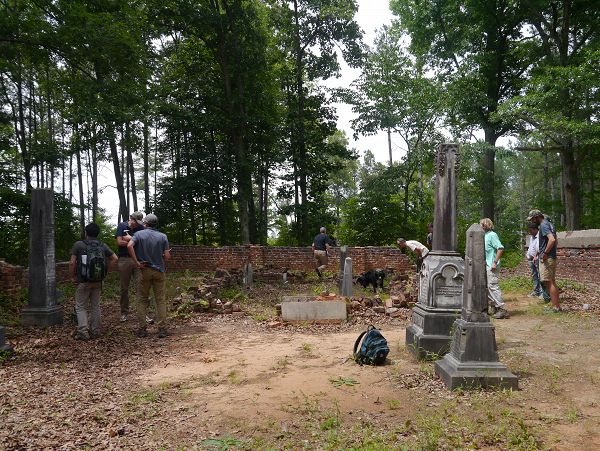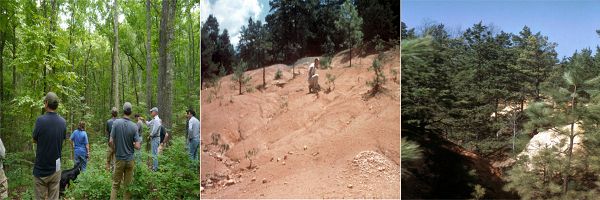RESEARCH



Do not fill out this information.
On this particular page, the Initial Text and Image fields for this template are not used (inactive). A Carousel Slideshow is displayed instead.
To edit the Carousel Slideshow, Choose Edit Existing > Carousel Slides. Then navigate to your CZO's entry entitled "Research"
The Calhoun CZO presents an important opportunity to evaluate CZ resilience, and to test a scientifically and socially significant hypothesis
"That the Southern Piedmont’s impressive post-agricultural reforestation masks persisting alterations in geomorphic, hydrologic, and biogeochemical processes of the region’s CZ that have important implications for ecosystem services today."
In support of this central hypothesis, five supporting hypotheses are being tested...
Ecohydrological Recovery:
"In CZs altered by land degradation and soil erosion, restoration of hydrologic functions depends on recoveries of macropore networks, biodiversity, and biogeochemical processes."
Calhoun researchers are bringing back to life gauged watersheds built by the U.S. Forest Service over 50 year ago. Re-instrumentation of the catchments is necessary to forecast changes in hydrologic functioning of the Calhoun CZ, and thereby test the Ecohydrological Recovery Hypothesis.
Archived stream and rain data housed at Coweeta Hydrologic Laboratory contain a detailed record of hydrologic response of eroded watersheds from the 1940s to present. The ability to hindcast will contribute to testing the Ecohydrological Recovery, Erosion-induced Carbon Dynamics, and Dynamic Persistence of Alternative States Hypotheses.
Biogeochemical Decoupling:
"In CZs altered by land degradation and soil erosion, biogeochemical processes in surficial components CZs become decoupled from those in deep layers."
In cooperation with Mr. Steve Stone, a local landowner, Dan Richter and Allan Bacon hired an engineering firm in 2010 to drill to a depth of nearly 70m.
Soil and unweathered granitic gneiss collected at regular intervals for comprehensive chemical analysis has established valuable measures of pedogenesis essential to testing the Biogeochemcial Decoupling Hypothesis.
The installation of an inverted tower at the Calhoun CZO will give reserachers access to deep soil, gas, and water samples. In conjunction with a eddy-covaraince flux tower to provide atmospheric data, direct observations from the uppermost to lowermost CZ will allow testing of the Decoupling Hypothesis, e.g. differences in carbon parameters between pristine hardwood and eroded plots.
Erosion-induced Carbon Dynamics:
"Delayed oxidation of eroded soil organic carbon (SOC) buried in oxygen-deficient alluvial sediments represents a substantial fraction of erosion-induced alterations of soil C cycling."
Holcombe's Branch will be intensively sampled to quantify soucres and sinks of SOC. Using numerous approaches to the characterization of soil C, researchers will have a detailed history of carbon mobilization and stabilization in the watershed.
Quantifying the potential for Fe and Al-oxide rich subsoils to stabilize SOC relative to surface horizons is central to testing the Erosion-induced Carbon Dynamics Hypothesis.
Human-CZ Interactions:
"Within a physiographic region, historic and contemporary human-forced alterations of the CZ fundamentally shape present and future management and livelihood options."
The legacy of cotton cultivation fundamentally altered the landscape of the Southern Piedmont. While the Calhoun LTSE has traced biogeochemical changes that accompanied forest growth on old fields, socio-economic changes in the region have been remarkable as well.
The Gist family cemetery is a sober reminder of the area's plantation history. William Henry Gist was Governor of South Carolina from 1858-1860 and a strong advocate of secession. Today, the former Gist property, known as Rose Hill State Park, has reference hardwood stands and gullied old fields that are being studied as part of the Calhoun CZO.
Dynamic Persistence of Alternative States:
"In CZs altered by land degradation and soil erosion, loss of surficial horizons, and reductions in infiltration, deep rooting, macroinvertebrates, and aggregation, impede redevelopment of forests and CZs with high productivity, standing biomass, and environmental services characteristic of forests never converted to cultivation agriculture."
Critical zone structure and function are being compared between remnant uncultivated hardwood forests, and directly adjacent old fields and pastures.
In cooperation with Mr. Steve Stone, a local landowner, Dan Richter and Allan Bacon hired an engineering firm in 2010 to drill to a depth of nearly 70m.
Soil and unweathered granitic gneiss collected at regular intervals for comprehensive chemical analysis has established valuable measures of pedogenesis essential to testing the Biogeochemcial Decoupling Hypothesis.
Archived stream and rain data housed at Coweeta Hydrologic Laboratory contain a detailed record of hydrologic response of eroded watersheds from the 1940s to present. The ability to hindcast will contribute to testing the Ecohydrological Recovery, Erosion-induced Carbon Dynamics, and Dynamic Persistence of Alternative States Hypotheses.
Calhoun researchers are bringing back to life gauged watersheds built by the U.S. Forest Service over 50 year ago. Re-instrumentation of the catchments is necessary to forecast changes in hydrologic functioning of the Calhoun CZ, and thereby test the Ecohydrological Recovery Hypothesis.
The installation of an inverted tower at the Calhoun CZO will give reserachers access to deep soil, gas, and water samples. In conjunction with a eddy-covaraince flux tower to provide atmospheric data, direct observations from the uppermost to lowermost CZ will allow testing of the Decoupling Hypothesis, e.g. differences in carbon parameters between pristine hardwood and eroded plots.
Calhoun researchers are bringing back to life gauged watersheds built by the U.S. Forest Service over 50 year ago. Re-instrumentation of the catchments is necessary to forecast changes in hydrologic functioning of the Calhoun CZ, and thereby test the Ecohydrological Recovery Hypothesis.
Holcombe's Branch will be intensively sampled to quantify soucres and sinks of SOC. Using numerous approaches to the characterization of soil C, researchers will have a detailed history of carbon mobilization and stabilization in the watershed.
Quantifying the potential for Fe and Al-oxide rich subsoils to stabilize SOC relative to surface horizons is central to testing the Erosion-induced Carbon Dynamics Hypothesis.
The installation of an inverted tower at the Calhoun CZO will give reserachers access to deep soil, gas, and water samples. In conjunction with a eddy-covaraince flux tower to provide atmospheric data, direct observations from the uppermost to lowermost CZ will allow testing of the Decoupling Hypothesis, e.g. differences in carbon parameters between pristine hardwood and eroded plots.
The legacy of cotton cultivation fundamentally altered the landscape of the Southern Piedmont. While the Calhoun LTSE has traced biogeochemical changes that accompanied forest growth on old fields, socio-economic changes in the region have been remarkable as well.
Critical zone structure and function are being compared between remnant uncultivated hardwood forests, and directly adjacent old fields and pastures.
The Gist family cemetery is a sober reminder of the area's plantation history. William Henry Gist was Governor of South Carolina from 1858-1860 and a strong advocate of secession. Today, the former Gist property, known as Rose Hill State Park, has reference hardwood stands and gullied old fields that are being studied as part of the Calhoun CZO.
Research News
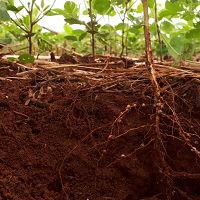
FEATURED NATIONALLY
NSF Blog: No soils, no life
27 Oct 2020 - They’re beneath our feet, but we seldom hear important signals in the soils
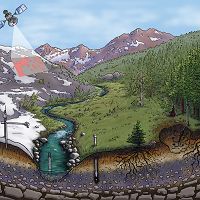
FEATURED NATIONALLY
2020 CZO Webinar Series on Sustainability
17 Jun 2020 - For an updated listing of these talks, including abstracts, see /national/education-outreach/sustainability-2020/ The U.S....

FEATURED
CZOs at AGU 2019
19 Nov 2019 - A list of CZ-related sessions, abstracts and events at the 2019 AGU Fall Meeting.

FEATURED
CZ colleagues: Please contact us about proposals for NSF’s CZ Collaborative Network, due 02 Dec 2019
08 Jul 2019 - CZO will end Nov 2020, succeeded by the “CZ Collaborative Network”. Let’s explore how the CZ community can build upon the CZOs via new NSF proposals.
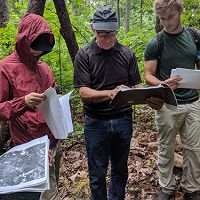
FEATURED
Graduate Student Critical Zone Reading Group Wraps the Semester with a Field Trip to Calhoun CZO
12 Jun 2019 - Five students travelled to Union, South Carolina for a two-day site visit June 6 – June 8 at the Calhoun CZO. This site visit was the...

FEATURED
Calhoun weathering paper published in Nature’s Scientific Reports
14 Mar 2019 - Calhoun weathering paper is out in Nature's Scientific Reports.
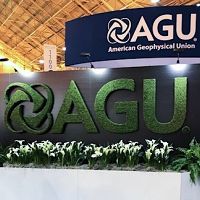
FEATURED
CZOs at AGU 2018
19 Nov 2018 - The 2018 AGU Fall Meeting will be held December 10-14 in Washington, D.C.
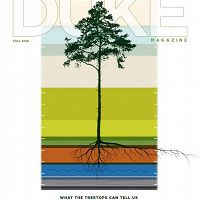
FEATURED
Calhoun CZO featured in Duke Magazine
14 Nov 2018 - How critical zone science unearths secrets: The new cross-disciplinary field of study concerns itself with the living skin of the Earth.

FEATURED
NSF Discovery articles focus on the CZOs.
10 May 2018 - The Discoveries section of the National Science Foundation's website on Critical Zone Observatories (CZOs).
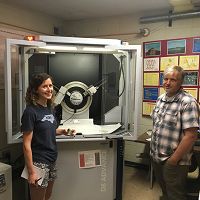
FEATURED
X-ray Diffraction for Clay Minerals at Calhoun
01 May 2017 - Anna Wade (visiting from Duke University) and Jay Austin (based at the University of Georgia) are collaborating by using X-ray Diffraction (XRD) to...
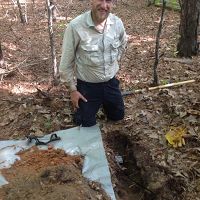
FEATURED
Zach Brecheisen wins the Frederick K. Weyerhaeuser Forest History Fellowship
27 Apr 2017 - The Forest History Society announces that Zachary Brecheisen is the 2017-18 recipient of the F. K. Weyerhaeuser Fellowship! The fellowship consists...
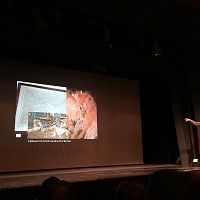
FEATURED
Bruno Latour talks about the Calhoun CZO in Munich
08 Dec 2016 - Bruno Latour, anthropologist and philosopher of science, gave a talk on Critical Zone science and the Anthropocene entitled "From the Anthropocene...
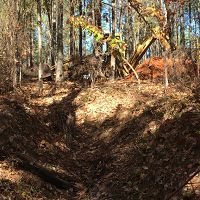
FEATURED
Four soil pits installed in new Research Area 8!
21 Nov 2016 - Four soil pits were installed in new Research Area 8 at the Calhoun CZO on 21-22 November 2016 for easy access for soil sampling down to 2 meters.
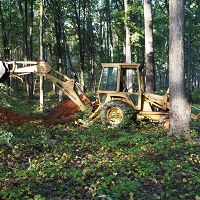
FEATURED
Eight new soil pits dug at the Calhoun!
17 Oct 2016 - Eight soil pits were installed at the Calhoun CZO on 17-18 October 2016 for easy access for soil sampling down to 2 meters. Photo: Will Cook.
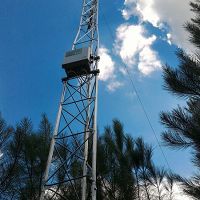
FEATURED
First flux tower erected at the Calhoun CZO
17 Aug 2016 - On August 17, 2016 a crew from Georgia Tech led by graduate student Yao Tang and professor Jingfeng Wang, with a little help from the folks at Duke,...
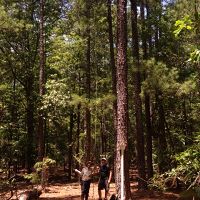
FEATURED
Going deep! Gas wells installed at 8.5 m
14 Jul 2016 - Another Calhoun CZO record - gas reservoirs installed at 8.5m depth! Jay Austin, Zach Brecheisen, and Dan Richter only stopped at 8.5m because they...
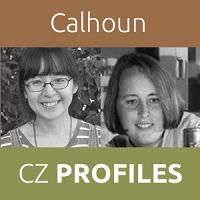
FEATURED
Critical Zone Profiles - Meet the people doing CZO science (Calhoun CZO)
15 Nov 2015 - Get a sense of the people and the work. Several members of the Calhoun CZO are profiled here, including students and professors.
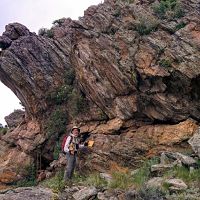
FEATURED
New study suggests bedrock weathering based on topography
30 Oct 2015 - St. Clair et al. suggest tectonic stresses interact with topography to influence bedrock weathering.
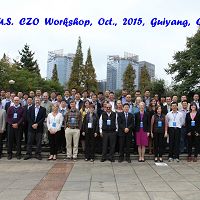
FEATURED
Sino-USA CZO scientists meet to discuss future collaborations
09 Oct 2015 - About 60 Chinese and American critical zone scientists met in Guiyang, China for two days of discussions and presentations on the significance of...
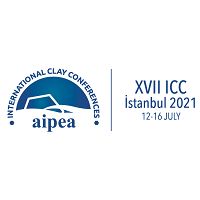
Sessions related to CZ Science at the 2021 International Clay Conference
27 Oct 2020 - The 17th International Clay Conference will be held July 12-16, 2021 in Istanbul, Turkey.
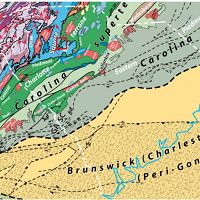
Geology of the Calhoun CZO
05 Jun 2020 - Barrett "Bear" Jordan's MS thesis on the geology of the Calhoun is now posted! Bear's advisor Paul Schroeder says this is "a bit more...

Mac Callaham’s group presents at the Society for Freshwater Science annual meeting
31 May 2019 - Mac Callaham and his group shared their research on earthworms at the May 2019 Society for Freshwater Science annual meeting in Salt Lake City.
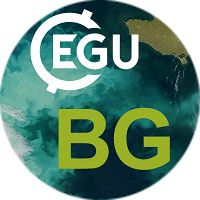
Discussion paper open till April 5th in Biogeosciences
06 Mar 2018 - A discussion is open for the manuscript, "Elevating the biogeosciences within environmental research networks".
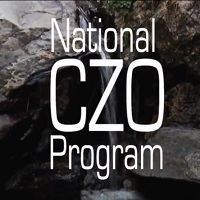
White paper of 2017 CZ Science Meeting in Arlington, VA
01 Jan 2018 - New Opportunities for Critical Zone Science Following the June 2017 Arlington Meeting for Critical Zone Science (hosted by CZO), a white booklet...
Example Publications
FEATURED
Impact of gully incision on hillslope hydrology. Chen, Xing, Mukesh Kumar, Daniel deB. Richter, and Yair Mau (2020): Hydrological Processes 34(19): 3848-3866
FEATURED
Ansichten der Calzone: Views of the Calhoun Critical Zone Observatory. Richter, Daniel D., and Sharon A. Billings (2020): In: Critical Zones: The Science and Politics of Landing on Earth, Editors: Bruno Latour & Peter Weibel, ZKM | Center for Art and Media, distributed by The MIT Press
FEATURED
Mapping depth to the argillic horizon on historically farmed soil currently under forests. Ryland, Rachel C., Aaron Thompson, Lori A.Sutter, Daniel Markewitz (2020): Geoderma 369, Article 114291
FEATURED
Persistent anthropogenic legacies structure depth dependence of regenerating rooting systems and their functions. Hauser, Emma, Daniel D. Richter, Daniel Markewitz, Zachary Brecheisen, and Sharon A. Billings (2020): Biogeochemistry 147: 259-275
FEATURED NATIONALLY
Quantification of Mixed-Layer Clays in Multiple Saturation States Using NEWMOD2: Implications for the Potassium Uplift Hypothesis in the SE United States. Austin, J.C., Richter, D.D. & Schroeder, P.A. (2020): Clays and Clay Minerals
FEATURED
Limited carbon contents of centuries old soils forming in legacy sediment. Wade, A., D.D. Richter, A. Cherkinsky, C.B. Craft, P.R. Heine (2020): Geomorphology 354: 107018
FEATURED
Soil production and the soil geomorphology legacy of Grove Karl Gilbert. Richter, Daniel D., Martha-Cary Eppes, Jason C. Austin, Allan R. Bacon, Sharon A. Billings, Zachary Brecheisen, Terry A. Ferguson, Daniel Markewitz, Julio Pachon, Paul A. Schroeder, Anna M. Wade (2020): Soil Science Society of America Journal 84(1): 1-20
FEATURED
Seasonal and spatial variation in the potential for iron reduction in soils of the Southeastern Piedmont of the US. Hodges, Caitlin, John Mallard, Daniel Markewitz, Diego Barcellos, AaronThompson (2019): CATENA 180: 32-40
FEATURED
The effect of accelerated soil erosion on hillslope morphology. Bonetti, Sara, Daniel D. Richter, Amilcare Porporato (2019): Earth Surface Processes and Landforms 44(15): 3007-3019
FEATURED
Ecological and genomic attributes of novel bacterial taxa that thrive in subsurface soil horizons. Brewer, Tess E., Emma L. Aronson, Keshav Arogyaswamy, Sharon A. Billings, Jon K. Botthoff, Ashley N. Campbell, Nicholas C. Dove, Dawson Fairbanks, Rachel E. Gallery, Stephen C. Hart, Jason Kaye, Gary King, Geoffrey Logan, Kathleen A. Lohse, Mia R. Maltz, Emilio Mayorga, Caitlin O’Neill, Sarah M. Owens, Aaron Packman, Jennifer Pett-Ridge, Alain F. Plante, Daniel D. Richter, Whendee L. Silver, Wendy H. Yang, Noah Fierer (2019): mBio Oct 2019, 10 (5) e01318-19 Cross-CZO National
FEATURED
Development and deployment of a field-portable soil O2 and CO2 gas analyzer and sampler. Brecheisen, Zachary S., Charles W. Cook, Paul R. Heine, Junmo Ryang, Daniel deB. Richter (2019): PLoS ONE 14(8): e0220176
FEATURED
Geostatistical analysis of historical contingency and land use footprints in the prehistoric settlement dynamics of the South Carolina Piedmont, North America. Coughlan, Michael R., and Donald R. Nelson (2019): Journal of Archaeological Science 107: 1-9
FEATURED
How to estimate statistically detectable trends in a time series: A study of soil carbon and nutrient concentrations at the Calhoun LTSE. Mobley, M.L., Y. Yang, R.D. Yanai, K.A. Nelson, A.R. Bacon, P.R. Heine, and D.D. Richter (2019): Soil Science Society of America Journal 83(s1): S133-S140
FEATURED
Natural, incidental, and engineered nanomaterials and their impacts on the Earth system. Hochella, Michael F., Jr., David W. Mogk, James Ranville, Irving C. Allen, George W. Luther, Linsey C. Marr, B. Peter McGrail, Mitsu Murayama, Nikolla P. Qafoku, Kevin M. Rosso, Nita Sahai, Paul A. Schroeder, Peter Vikesland, Paul Westerhoff, Yi Yang (2019): Science 363 (6434): eaau8299
FEATURED
Distinct contributions of eroding and depositional profiles to land-atmosphere CO2 exchange in two contrasting forests. Billings, Sharon A., Daniel de B. Richter, Susan E. Ziegler, Karen Prestegaard, and Anna M. Wade (2019): Frontiers in Earth Science 7: article 36
FEATURED
Links between physical and chemical weathering inferred from a 65-m-deep borehole through Earth’s critical zone. Holbrook, W. Steven, Virginia Marcon, Allan R. Bacon, Susan L. Brantley, Bradley J. Carr, Brady A. Flinchum, Daniel D. Richter, & Clifford S. Riebe (2019): Scientific Reports 9: Article number 4495
FEATURED
Mercury sourcing and sequestration in weathering profiles at six Critical Zone Observatories. Richardson, Justin B., Arnulfo A. Aguirre, Heather L. Buss, A. Toby O'Geen, Xin Gu, Daniella M. Rempe, and Daniel deB. Richter (2018): Global Biogeochemical Cycles, 32(10):1542-1555 Cross-CZO National
FEATURED
The formation of clay‐enriched horizons by lessivage. Calabrese, Salvatore, Daniel D. Richter, and Amilcare Porporato (2018): Geophysical Research Letters 45(15): 7588-7595
FEATURED
Loss of deep roots limits biogenic agents of soil development that are only partially restored by decades of forest regeneration. Billings, S.A., D. Hirmas, P.L. Sullivan, C.A. Lehmeier, S. Bagchi, K. Min, Z. Brecheisen, E. Hauser, R. Stair, R. Flournoy, D. deB. Richter (2018): Elementa Science of the Anthropocene 6(1): 34
FEATURED
Clays in the Critical Zone. Paul A. Schroeder (2018): Cambridge University Press, Cambridge, UK Cross-CZO National
FEATURED
Ideas and perspectives: Strengthening the biogeosciences in environmental research networks. Richter, D.D., S.A. Billings, P.M. Groffman, E.F. Kelly, K.A. Lohse, W.H. McDowell, T.S. White, S. Anderson, D.D. Baldocchi, S. Banwart, S. Brantley, J.J. Braun, Z.S. Brecheisen, C.W. Cook, H.E. Hartnett, S.E. Hobbie, J. Gaillardet, E. Jobbagy, H.F. Jungkunst, C.E. Kazanski, J. Krishnaswamy, D. Markewitz, K. O’Neill, C.S. Riebe, P. Schroeder, C. Siebe, W.L. Silver, A. Thompson, A. Verhoef, G. Zhang (2018): Biogeosciences 15: 4815-4832 Cross-CZO National
FEATURED
Influences of Native American land use on the Colonial Euro-American settlement of the South Carolina Piedmont. Coughlan, Michael R., and Donald R. Nelson (2018): PLoS ONE 13(3): e0195036
FEATURED
Historical land use dynamics in the highly degraded landscape of the Calhoun Critical Zone Observatory. Coughlan, Michael R., Donald R. Nelson, Michael Lonneman, and Ashley E. Block (2017): Land 6(2), 32
FEATURED
Boom and bust carbon-nitrogen dynamics during reforestation. Parolari, A.J., M.L. Mobley, A.R. Bacon, G.G. Katul, D.deB. Richter, and A. Porporato (2017): Ecological Modelling 360: 108-119
FEATURED
Special issue of The Earth Scientist about the Critical Zone and the US NSF Critical Zone Observatory (CZO) program. CZO Education/Outreach team (2016): The Earth Scientist, Volume XXXII, Issue 3, Fall 2016 Cross-CZO National
FEATURED
Geophysical imaging reveals topographic stress control of bedrock weathering. St. Clair, J., S. Moon, W. S. Holbrook, J. T. Perron, C. S. Riebe, S. J. Martel, B. Carr, C. Harman, K. Singha, D. deB. Richter (2015): Science 350 (6260): 534-538 Cross-CZO National
Channelization cascade in landscape evolution. Bonetti, S., M. Hooshyar, C. Camporeale, and A. Porporato (2020): PNAS 117(3): 1375-1382
Variational analysis of landscape elevation and drainage networks. Hooshyar, M., S. Anand, and A. Porporato (2020): Proceedings of the Royal Society A, 476(2239), 20190775
Wetness controls on global chemical weathering. Calabrese, S., and A. Porporato (2020): Environmental Research Communications 2(8), 085005
Rainfall intensification increases the contribution of rewetting pulses to soil heterotrophic respiration. Manzoni, S., A. Chakrawal, T. Fischer, J.P. Schimel, A. Porporato, and G. Vico (2020): Biogeosciences 17(15): 4007-4023
From turbulence to landscapes: Logarithmic mean profiles in bounded complex systems. Hooshyar, M., S. Bonetti, A. Singh, E. Foufoula-Georgiou, and A. Porporato (2020): Physical Review E 102, 033107
Linear layout of multiple flow-direction networks for landscape-evolution simulations. Anand, S.K., M. Hooshyar, and A. Porporato (2020): Environmental Modelling & Software 133: 104804
Development of Martian regolith and bedrock simulants: Potential and limitations of Martian regolith as an in-situ resource. Fackrell, Laura E., Paul A. Schroeder, Aaron Thompson, Karen Stockstill-Cahill, Charles A.Hibbitts (2020): Icarus 354: 114055
Explore Further
